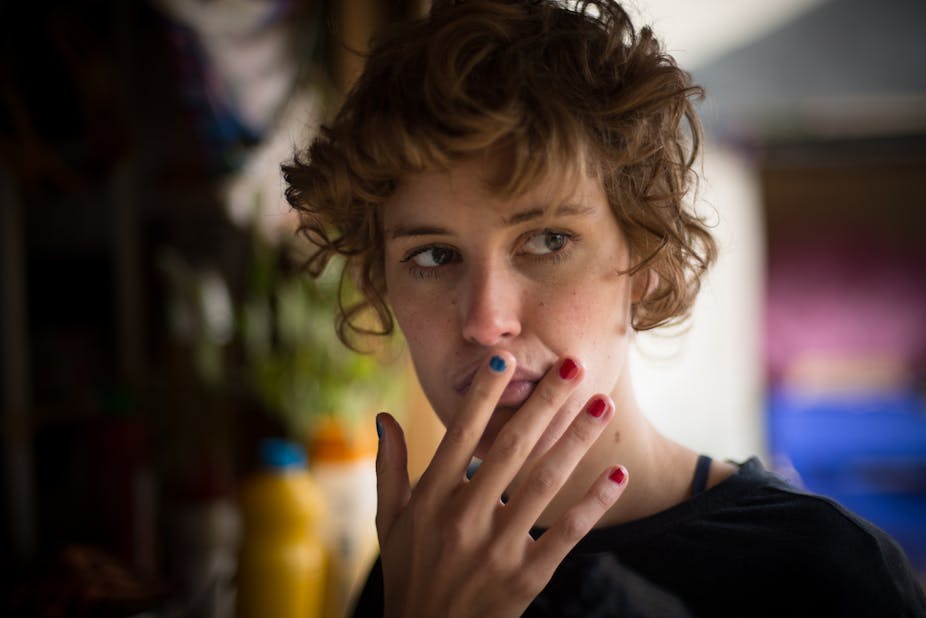Wetlands, directed by David Wnendt and based on the best-selling novel by Charlotte Roche, is part of an ever-expanding body of work that gives the lie to the “sugar and spice” conception of women and girls’ sexuality.
Playing as part of the Melbourne International Film Festival’s International Panorama, this German film is about a sensation-seeking young woman, Helen Memel (Carla Juri), who relishes sex, germs and body fluids. Describing herself as a “living pussy hygiene experiment”, Helen resolves to live as filthy a life as possible. Her favoured exploits include wiping her bare backside on public toilet seats and swapping tampons with her best friend Corinna (Marlen Kruse), a girl who was ostracised at school after she performed a scatological sex act on her boyfriend.
Watching Wetlands is an unquestionably visceral experience and is not for the easily repulsed. The exposition is a veritable hazing ritual for audiences: in the first 15 minutes, Helen wades through toilet sewerage, discusses the consistency of her cervical mucous and picks at the haemorrhoids that have her plagued her since childhood.
The gross-outs taper off slightly (but certainly not entirely) once the story begins in earnest. One morning before school, Helen accidentally nicks her anus while shaving her nether regions and is hospitalised for rectal surgery. While there, she decides to “parent-trap” her divorced mother and father, hoping to trick them into visiting the hospital at the same time and subsequently to rekindle their relationship.
For all its taboo-breaking content, Wetlands is underpinned by a heartfelt sincerity and sweetness — the girl who thinks nothing of contaminated toilet seats is actually a softie who cannot accept her parents’ separation.
Women’s transgressive desire is certainly not a new theme upon which to base a narrative. Earlier texts like Catherine Breillat’s film Romance (1999), Lena Dunham’s TV series Girls (2012 – ) and Caitlin Moran’s novel How To Build a Girl (2014) make a point of being candid about the indecorous dimensions of women’s sexuality.
What makes Wetlands idiosyncratic is the way it marries this impulse to the concerns of the teen film genre. Wnendt’s film addresses a common adolescent concern: the feeling of being invisible to one’s parents. The solution it proposes is a hyper-engagement with one’s own body.
A series of flashbacks inform us that Helen’s mother and father constantly ignored their daughter as a child, recoiling whenever she initiated any form of intimacy with them. In one of these scenes, eight-year-old Helen attempts to inflate a pink flotation device — realising she cannot do it herself, she asks her father to blow it up for her. She gauchely declares that the exchange of saliva involved in the act is like a kiss, something that leaves her dad nonplussed. This scene repeats itself in the diegetic present when Helen’s father inflates a haemorrhoid pillow.

These scenes give the impression that Helen was left alone as a child to peel her scabs and pick her nose. In the absence of her parents’ recognition, she continued this behaviour into her adolescent life as a means of asserting her own being. Instead of talking with one’s peers (the proposed solution to adolescent loneliness in films like The Breakfast Club (John Hughes, 1985) or forming a surrogate family with other teens - Rebel Without a Cause (Nicholas Ray, 1955); Skins (2007-13) - the ratification of selfhood in Wetlands occurs through a relishing of body fluids.
The unbroken taboo
For all this, however, Wetlands does not capture the feeling of adolescence very well.
Although the film bears the hallmarks of a YA sensibility — adults are buffoons, teens are the repositories of wisdom — Helen is about 18 years old and is therefore legally an adult. She checks herself into hospital without needing her parents’ consent, and she makes the very mature decision to move in with her boyfriend at the film’s conclusion.
Actress Carla Juri was 27 at the time of filming. Although she delivers a lively performance as Helen, her casting is central to the problem. For all her preoccupation with bodily functions, Helen possesses none of the acne-riddled, braces-clad ungainliness that makes adolescence such an excruciatingly physical experience.
Put bluntly, Juri is simply too beautiful and graceful to be a convincing teen. Given the importance of visual spectacle to the film, this inconsistency is difficult to ignore. One gets the feeling that the only taboo Wetlands cannot break is that of putting an awkward or “unattractive” female body in the starring role.
For all its colourful grotesquery, Wetlands misses a key point of both teen fiction and much of the work on women’s corporeality. You don’t need to act gross. According to the norms of society, your very personhood is gross.
Such an idea is captured with verve and humour in films like Carrie (Brian De Palma, 1976) and Ginger Snaps (John Fawcett, 2000). Self-possessed and trying too hard, Helen just seems like she’s faking it.
The Melbourne International Film Festival 2014 runs until Sunday August 17. See all MIFF 2014 coverage on The Conversation here.

